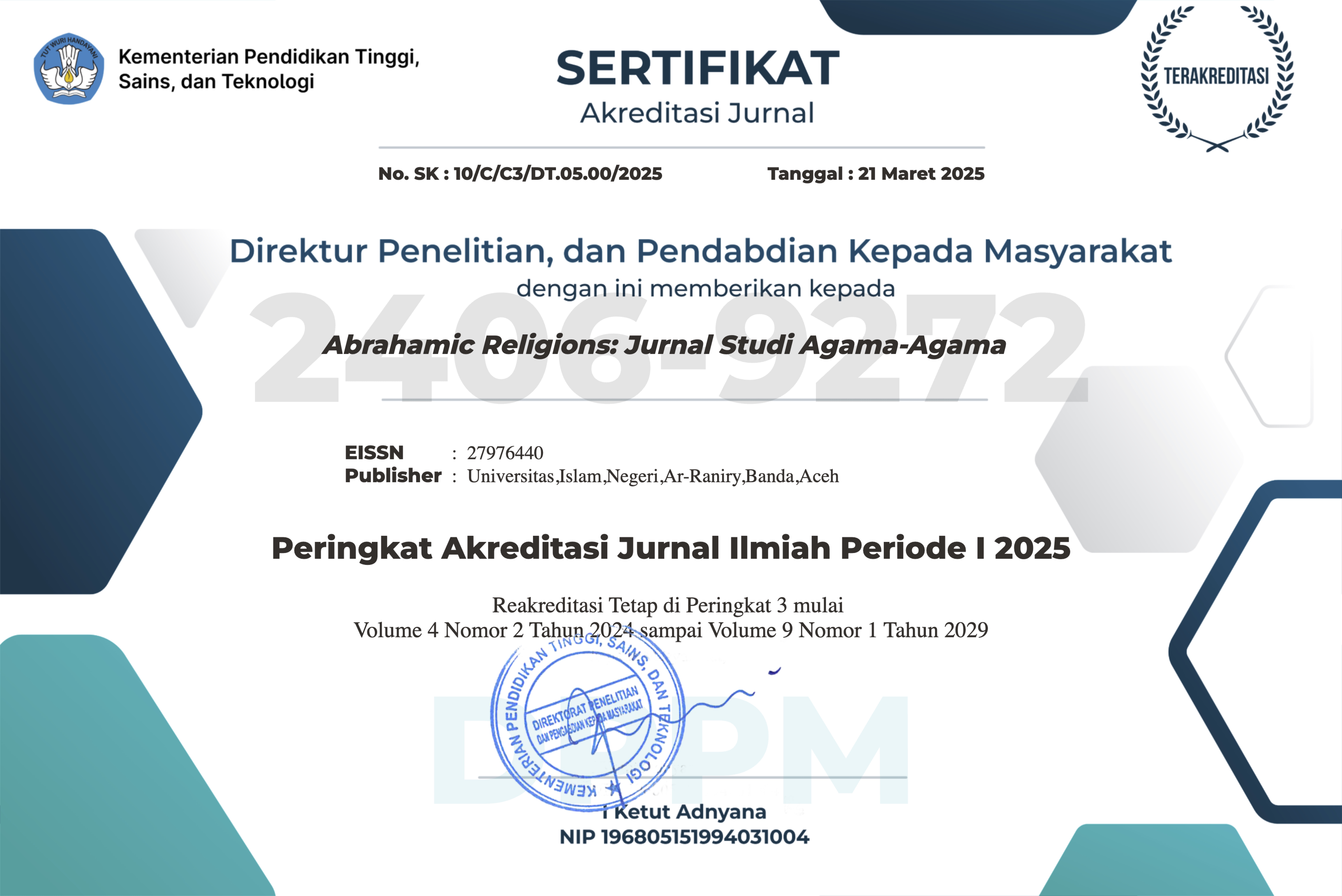Materialism and Religious Perspective: An Analysis of Karl Marx's Thought
DOI:
https://doi.org/10.22373/arj.v4i1.22800Keywords:
Materialism, Religion, Karl MarxAbstract
Karl Marx was a philosopher and social observer, whose intelligence and brilliant thinking earned him a position as a political leader among the proletarian class of his time. For Marx, the essence of humanity lies in labor, and religion is a product and expression of the interests of the oppressed lower classes. Living in Europe during the industrial age, Marx's thoughts differed significantly from those of other philosophers of his time. This text examines Marx's thoughts on Materialism, religious beliefs, and Marxist Economics. Research findings indicate that Historical Materialism proposed by Marx is a useful term for providing the basic assumptions of his theory. The emphasis in his work "Das Kapital" is on the material needs and the struggle to enhance socialist revolution so that the proletariat can enjoy the majority of what is produced by industrialism. Marx believed that the ownership of the means of production in society should be evenly distributed according to human needs, not to the greed of a few. Religion, Marx argued, is an opiate for the masses, manipulating them with promises of eternal futures, thus alienating them from reality. In the capitalist economic system, Marx contended that fair wages for labor should be determined equally, just as the value of each commodity is determined by the amount of labor, meaning that employers should pay workers according to their laborReferences
Bagus, L. (2005). Kamus Filsafat. Gramedia.
Black, J. A., & Champion, J. J. (1999). Metode dan Masalah Penelitian Sosial. Refika Aditama.
Budiman, A. (2000). Teori Pembangunan Dunia Ketiga. Gramedia.
Chirot, D. (2000). Changing Fashion in The Study of Social and Politic Change (Suwarno (ed.)). LP3ES.
Damsar. (2011). Pengatar Sosiologi Pendidikan. Prenada Media Group.
Ebenstein, W. (2006). Isme-Isme yang Mengguncang Dunia: Komunisme, Fasisme, Kapatalisme, dan Sosialisme. Narasi.
Faqih, M. (2002). Jalan Lain Manifest Intelektual Organik. Pustaka Pelajar.
Farihah, I. (2015). Falsafah Materalisma Karl Marx: Epistimologi, Dialektical, Materialism. AL-Fikrah: Ilmu Aqidah Dan Ilmu Keagamaan, 3(2), 432–433.
Giddens, A. (1986). Kapitalisme dan Teori Sosial Modern: Suatu Analisis Karya Tulis Marx, Durkeim, dan Max Weber. UI Press.
Hakim, A. A., & Ahmad, B. (2008). Filsafat Umum dari Mitologi Sampai Teofifilogi. Pustaka Setia.
Hasan, M., & Aziz, M. (2018). Pembangunan Ekonomi dan Pemberdayaan Masyarakat: Strategi Pembangunanan Manusia dalam Perspektif Ekonomi Lokal. Nur Lina.
Jary, D., & Jary, J. (1991). Dictionary of Sociology. Harper Collins Publisher.
Johnson, D. P. (1986). Teori Sosiologi Klasik dan Modern (Robert M Z Lwang (ed.); Terjemahan). Gramedia Pustaka Utama.
Johnson, D. P. (1988). Teori Sosiologi Klasik dan Modern. Gramedia.
Lavine, T. . (2002). Pertualangan Filsafat Dari Socrates ke Sarte. Jendela.
Maksum, A. (2016). Pengatar Filsafat Dari Masa Klasik Hingga Postmodernisme. Ar-Ruzz Media.
Mariani, A. (2013). Karl Marx dan Imajinasi Sosialisme. Aditya Media.
Martono, N. (2011). Sosiologi Perubahan Sosial: Perspektif Skasik, Postmodern, dan Post Kolonial. Raja Grafindo Persada.
Marx, K. (1976a). Manusia dan Pejuang (David & Dkk (eds.); Terjemahan). Harmondsworth.
Marx, K. (1976b). Theses on Feuerbach. Foreign Languages Press.
Marx, K. (2004). Kapital: Sebuah Kritik Ekonomi Politik (Volume I T). Hasta Mitra.
Miskievich, L. (1986). Kata Pengantar pada Volume 28 dari Kumpulan karya Karl Marx dan Frederick Engels. Marx and Freedirck Engels, xii.
Muttaqin, A. (1970). Karl Marx dan Friederick Nietzsche Tentang Agama. Dakwah Dan Komunikasi (KOMONIKA), 7(1), 1–32.
Praja Juhana S. (2022). Aliran-Aliran Filsafat dan Etika. Yayasan Piara.
Ramli, A. M. (1982). Peta Pemikiran Karl Marx. LKis.
Ritzer, & Goodman. (2004). Sociological Theory. McGraw Companies.
S, V. (2014). Ekonomi dan Sosial Demokrasi. Riedrich Ebert Stiftung Divisi Akademik Politik Bonn.
Salam, S., & Fadilah, A. (2019). Sosiologi Pengantar Studi Pembangunan Lintas Sektoral. Lembaga Penelitian UIN Syarifullah Jakarta: UIN Press.
Salim, P., & Salim, Y. (2000). Kamus Besar Indonesia. Balai Pustaka.
Seven, D. L. P. (1966). Theory of Religion. Oxford University Press.
Suseno, F. M. (1982). Pengatar: Dilema Usaha Manusia Rasional. Gramedia.
Suseno, F. M. (1999). Karl Marx dari Sosialisme Utopis ke perselisihan Revisionosme (Hegel (ed.)). Gramedia Pustaka Utama.
Suwasono. (2000). Perubahan Sosial dan Pembangunan. LP3ES.
Sztompka, P., & Santosa, T. W. (2005). Sosiologi Perubahan Sosial (Alimandan (ed.); Terjemahan). Prenanda.
Weij, A. Van Der. (1988). Filosof-Filosof Besar Tentang Manusia. PT Gramedia Pustaka Utama.
Downloads
Published
Issue
Section
License
Authors who publish in this Journal agree to the following terms:
- Authors retain copyright and grant the journal right of first publication with the work simultaneously licensed under Attribution-ShareAlike 4.0 International (CC BY-SA 4.0) allows others to share the work with an acknowledgment of the work's authorship and initial publication in this journal.
- Authors are able to enter into separate, additional contractual arrangements for the non-exclusive distribution of the journal's published version of the work (e.g., post it to an institutional repository or publish it in a book), with an acknowledgment of its initial publication in this journal.
- Authors are permitted and encouraged to post their work online (e.g., in institutional repositories or on their website) prior to and during the submission process, as it can lead to productive exchanges, as well as earlier and greater citation of published work. (See The Effect of Open Acces)















